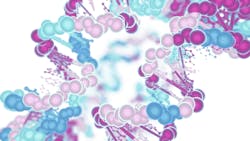Researchers at Children’s Hospital of Philadelphia (CHOP) and the University of California, Los Angeles (UCLA) have developed a computational platform capable of discovering tumor antigens derived from alternative RNA splicing, expanding the pool of cancer immunotherapy targets. The tool, called “Isoform peptides from RNA splicing for Immunotherapy target Screening” (IRIS), was described in a paper published in the Proceedings of the National Academy of Sciences.
Alternative splicing is an essential process that allows for one gene to code for many gene products, based on where the RNA is cut and joined, or spliced, before being translated into proteins. However, the splicing process is dysregulated in cancer cells, which often take advantage of this process to produce proteins that promote growth and survival, allowing them to replicate uncontrollably and metastasize. This happens in many adult and pediatric cancers. Scientists have suggested splicing dysregulation could be a source of novel tumor antigens for immunotherapy, but identifying such antigens has been a challenge.
To address this difficulty, the researchers created IRIS to leverage large-scale tumor and normal RNA sequencing data and incorporate multiple screening approaches to discover tumor antigens that arise due to alternative splicing. Integrating RNA sequencing-based transcriptomics data and mass spectrometry-based proteomics data, the researchers showed that hundreds of IRIS-predicted TCR targets are presented by human leukocyte antigen (HLA) molecules, the part of the human immune system that presents antigens to T cells.
The researchers then applied IRIS to RNA sequencing data from neuroendocrine prostate cancer (NEPC), a metastatic and highly lethal disease known to involve shifts in RNA splicing, as discovered in a prior study by CHOP and UCLA researchers. From 2,939 alternative splicing events enriched in NEPC, IRIS predicted 1,651 peptides as potential TCR targets. The researchers then applied a more stringent screening test, which prioritized 48 potential targets. Interestingly, the researchers found that these targets were highly enriched for peptides encoded by short sequences of less than 30 nucleotides in length – also known as “microexons” – which may arise from a unique program of splicing dysregulation in this type of cancer.
To validate the immunogenicity of these targets, the researchers isolated T cells reactive to IRIS-predicted targets, and then used single-cell sequencing to identify the TCR sequences. The researchers modified human peripheral blood mononuclear cells with seven TCRs and found they were highly reactive against targets predicted by IRIS to be good immunotherapy candidates. One TCR was particularly efficient at killing tumor cells expressing the target peptide of interest.

